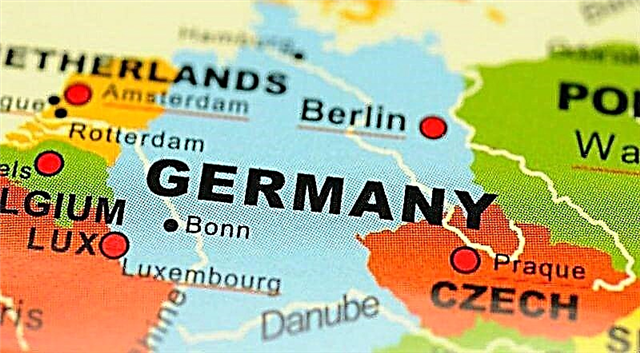Germany offers a large number of vacancies and attractive career prospects for young and promising professionals. But before collecting documents, looking for proposals and moving, citizens of the CIS countries should get acquainted with the specifics and features of official employment in Germany.
The economic situation in Germany today
The German economy is the largest economic system in Europe, as there is a regular increase in GDP and per capita income, as well as a significant decrease in unemployment. In the last decade, employment in Germany has reached record levels, the number of employed people has increased from 638 thousand to 44.3 million person (on 1,5%). It is also important that women and men receive approximately the same wages.

Due to the rapid economic growth, the demand for labor is growing, including for migrants from the CIS countries. Today, a Kazakhstani, Kyrgyzstani, Ukrainian, Tajik or Russian in Germany is able to get a decent job in any field of activity. At the beginning of 2021, Berlin was registered 17,2% of Russian-speaking citizens of the total number of employed, more 0,3% - Romanian and Moldovan citizens.
Advantages and disadvantages of working in Germany:
| pros | Minuses |
| High standard of living of the population | Serious competition in the labor market |
| High level of wages | High tax levies |
| Economic stability - investment opportunities | Requirement for confirmation of a higher education diploma |
| Obtaining permanent residence after 5 years of work and life | The need for proficiency in German or English at a high level |
| Lack of corruption and bureaucracy, simple and transparent system of paperwork | Lower wages compared to the local population |
The most in-demand professions in Germany in 2021

The level of competition in hiring depends on the profession. It will be much easier for representatives of rare specialties in Germany to find a job.
List of the highest paid and demanded professions in Germany:
- doctors - € 79,538 per year;
- lawyers - 74,013 euros per year;
- engineers - 70 888 euros per year;
- programmers - 69,133 euros per year;
- economists - 64 654 euros per year.
| Job type | Current offers in 2021 |
| Seasonal work (for summer) | work on the farm (collecting fresh crops, growing plants, caring for animals); girls can get a job as a waiter; administrator |
| Temporary job | builder; welder; foreman; bridge bridge; an electrician |
| Work without knowing the language | woodcutter (forester); driver; Cook; security guard |
| Watch | trucker; handyman; tractor driver; factory work |
| By contract | doctor (therapist, dentist, surgeon); mechanic; engineer; programmer; salesman |
| Residential work | nanny, home nurse, nurse (for girls); |
| Remote work | respondents to participate in research; copywriters and rewriters |
| Work for students or part-time | work in warehouses or greenhouses; packers of goods and souvenirs |
Wage level
You May Also Like
The legal minimum wage is 8.5 euros per hour of work. With an 8-hour working day, the rate is 68 euros, 340 per week and 1,360 euros per month for 160 hours of work.
The average salary in Germany depends on the specific region, industry and the capabilities of the company, as a whole in the country is 3500 euros per month.
Specificity of the workflow
Many citizens of the CIS countries who have been working in Germany for a long time are inclined to positively assess the working conditions in German companies and dream of joining the team of companies.
Features of work in Germany:
- Verbal agreements when applying for a job should not be taken into account, it is advisable to be guided solely by the rules prescribed in the contract.
- The working week in Germany is regulated by an employment contract, usually equal to 38-40 hours.
- Duty and extra shifts are always paid.
- Every employee is entitled to paid leave (usually 30 days a year).
The work process in Germany also depends on the industry. So, in the agricultural sector and construction, the principle of seasonal work with an irregular schedule is often used. Teachers, financial officials, and cultural workers often work under contracts that define their responsibilities, earnings, and how long they will work.
Details here:
Ways to find a job in Germany
A job seeker in the German labor market can search for a vacancy of interest to him on the following portals:
- Federal Labor Exchange - www.arbeitsagentur.de. On this site you can register and apply for a job. Proposals are published in a specific area, there is an advanced search option. The portal is available in English.
- Direct websites of employers' companies - contain detailed requirements for job seekers, necessary contacts and phone numbers.
- Online exchanges and search engines in German http://www.experteer.de/ https://www.jobleads.de/
- Work for students https://www.studentjob.de/.
- Portals for graduates and young professionals with vacancies from large companies (Staufenbiel www.staufenbiel.de and Absolventa www.absolventa.de).
- Job search agencies abroad (intermediaries).

Employment types
You May Also Like
Despite the stable economic growth, it has recently become much more difficult for Russian-speaking citizens to find a job in this state. Nevertheless, at the beginning of 2021, labor exchanges offer quite a lot of options for job seekers from the CIS.
Working in Germany without knowing German
It will be difficult to build a career abroad without knowing German, but it is possible if you know English. In this case, the requirements depend on the field of activity. For example, for doctors, managers and other specialists who are obliged to work directly with clients, knowledge of the national language will be fundamental. The large international branches in Germany, on the other hand, speak English.
In addition, knowledge of German is not required in work areas. Gardeners, builders, housekeepers (housekeepers, nurses and cleaners) can get jobs in Germany, but the salaries of such specialists will be minimal.
Seasonal work
Seasonal employment in Germany is a type of work that, due to climatic conditions, is performed only at certain times of the year. It is the most demanded job for low-skilled professionals, youth and students.
Most of the vacancies for seasonal employment can be found in the summer. It was during this period that numerous farms require labor for processing and harvesting. Labor migrants from the CIS often choose this option of earning money, since most employers are ready to cover the costs of travel to the place of work, food and accommodation.
There is also work from October to April related to snow removal and road processing. These jobs are more difficult to find, but they pay higher. For those wishing to visit Germany in winter, German companies also offer work on the collection and packaging of New Year's toys and souvenirs.
Temporary job
Temporary work is considered to be work for a period not exceeding two months. In Germany, such vacancies in 2021 can be found in a wide variety of fields of activity. For temporary employment, the applicant will need excellent knowledge of English, minimal knowledge of German, education and communication skills.
Subject to these criteria, a foreigner can apply for the following positions:
- administrator;
- salesman;
- Secretary;
- tour guide (guide);
- waiter.
Temporary employment can also mean replacing employees during his absence. Most often this applies to high-level professionals who work in large international companies.
Other options
For employment in Germany in 2021, there are also offers of a different type:
- Contract job. The most common type of registration, in which the employer and the applicant can conclude an agreement of any length. An important difference between this type of employment is that the employment relationship is documented. The papers will indicate the terms of work, its conditions, the right to reside on the employer's territory and the official salary.
- Remote employment. This type of work does not require moving to Germany, the employee can work in his home country, while receiving a salary in euros. Vacancies are widespread for translators, article authors, website developers and programmers.
Remote work requires excellent knowledge of the German language!
Official employment procedure
The main task in official employment in Germany for Russian-speaking citizens is to obtain a work permit. For most foreigners, this means looking for a job even before moving to Germany.

Residents of EU states have the right to free employment in the German labor market.
Priority of actions
If the employer is ready to provide a job, then the following algorithm must be observed:
- Search for an open vacancy, negotiations with a German company, signing a contract.
- Sending information to the Federal Employment Agency and the Office of Immigration.
- Waiting for a positive decision.
- Preparation and submission of documents to the German diplomatic mission in your country.
After graduating from a German university (subject to being in Germany):
- An interview with an employer.
- Registration of an employment contract.
- The employment contract is sent to the Federal Employment Agency.
The results of the review are reported within a month.
When applying for an EU Blue Card:
- Passing an interview with an employer.
- Signing a contract.
- Contacting the consulate with a full package of documents, including a higher education diploma (prerequisite) and a contract of employment.

Without an invitation:
- Search for open vacancies on the portal of the Federal Employment Agency www.arbeitsagentur.de Germany. Filing an application.
- Waiting for the approval of the decision to issue a permit.
- Contacting the German Embassy with the documents according to the attached list for obtaining a work visa.
Types of work permits
Work in Germany can only be available with one of the following types of permits:
- Blue card. One of the most convenient and prestigious documents for labor migrants. To obtain it, a foreigner must have a higher education and a formalized employment contract with a German employer. In addition, the applicant's salary level must be not less than 52,000 euros in year.
- General employment permit. Issued to citizens with different qualifications. A foreigner will need an employment contract and proof of qualifications.
Higher education is not required for a work permit.
- Work visa for highly qualified specialists. Issued to foreigners with special training under a contract with a German employer. The required salary specified in the contract cannot be less 86,000 euros in year.

Categories that do not require a work permit
Citizens who do not require a work permit include interns whose practice period does not exceed 90 days, and volunteers. In this case, the foreigner will not need a work visa, but a regular Schengen visa.
List of main documents
The package of documents for the official employment of a citizen who does not have an EU passport includes:
- national and foreign passports (with a minimum validity of three months after the expiration of the visa);
- registration of biometric data (fingerprint procedure);
- certificate of income confirmation. Example:

- visa application form with photographs. To be completed in Russian and German. Passport data, place of residence and registration are entered. Sample;

- medical insurance covering the entire period of stay in Germany. Sample:

In addition to the standard set of documents, in order to travel to the place of work, you may need some medical certificates or additional papers.
Registration of a work visa
After submitting a mandatory package of documents to the consulate, the applicant is required to wait for a decision on the results of the consideration from 6 to 12 weeks.
Selection Criteria for Applicants for a Work Visa
To obtain a work visa without an EU passport, the applicant must have:
- High income (from 4,000 euros per month).
- Having a diploma of higher education and confirmation of a high level of qualifications.
- The level of knowledge of the German language.
- Proof of law-abidingness, no criminal record and no recorded violations.
Since June 2017, Ukraine and Moldova have signed an agreement with the EU countries, according to which citizens are allowed to leave for Europe without a visa, but this regime does not affect the right to employment. Russia, Uzbekistan, Tajikistan and their state border crossing systems are not covered by the bill.
More details here:
PuMa program: points system and their accrual
PuMa is a pilot project valid until September 30, 2019... It allows labor migrants to obtain work and residence permits, gaining 100 points on the German language test.
To pass the exam, the candidate must prove a high level of proficiency in German (level B2 or higher). In addition, additional points can be obtained for knowledge of English or French.
Work visa extension
Usually a work visa is issued for 3 months, and after moving to Germany, the employee receives a residence permit for the specified period. In the case of a long-term employment contract, a visa can be obtained for 2 years and extended after its expiration for another 2 years. After 5 years of living in Germany, it is possible to obtain permanent residence for permanent residence abroad.

Other details
German law regulates the employment of immigrants, therefore, before moving, a foreigner should remember the following rules:
- After the initial interview with the employer, the migrant worker is recommended to check the company for the availability of a document granting the right to attract foreign labor.
- An employer can independently issue a work permit for a foreign citizen by submitting an application to the local labor office.
- The employer does not have the right to demand payment from the applicant for obtaining a permit or providing a job.
Business immigration to Germany
The businessman will have to meet with the local administration and provide it with a detailed project plan, taking into account all important details - the quality and quantity of services provided, costs and estimated income, marketing moves and an indication of funding sources.
After the approval of the project, the businessman can proceed to apply for a national visa, which is the main document for emigration. According to this regulation §21, a citizen can obtain a residence permit if his business contributes to the development of the German economy.
Features of internship in the country
An internship in Germany, like in another European country, is considered a serious work experience that can significantly affect the career of a young specialist.
Conditions for an internship in Germany:
- A potential intern must be a student of a higher education institution - a senior undergraduate, graduate or postgraduate student.
- The trainee must be fluent in German or English.
- It is advisable for the applicant to apply for an internship at least in 4 months before the start of the program.

You can find suitable projects on special exchanges. In addition, if a student is confident in his abilities and wants to do an internship in a certain company, he can send his resume directly to the employer's mail. In case of a successful interview, the trainee must sign an agreement, which will indicate his work schedule, responsibilities and conditions and terms of work.
Upon completion of the work, the student receives a certificate of completion of the internship, which he can use to find a permanent job.
Watch the video:
Consequences for attempting illegal employment in Germany
Illegal work in Germany (Schwarzarbeit) is prohibited by law. This prohibition applies to both ordinary citizens and foreigners, but additional rules apply to migrants.
So, the following categories of persons fall under administrative and criminal liability:
- taxpayers who neglect their tax obligations;
- recipients of social assistance who did not comply with reporting to social departments;
- workers who ignore reporting to regulatory and fishing authorities.
If such violations are identified, the employee faces a serious fine and deportation from the country.
Reviews of migrants from the CIS countries about working in Germany
A certain idea of the work can be given by the testimonials of immigrants who currently live and work in Germany:
Evgeniy: “I adore this country (Belarusian himself). The first time I got to Germany for a while, even then I realized that I would return to permanent residence. Now I work legally, I have the same rights as the Germans. By the way, it is almost impossible to get a normal job there illegally. Knowledge of the language is very important, of course. "
Nikolay: “Perhaps the most conservative of all European countries in terms of technology. IT specialists have nothing to do there - the initiative is not encouraged, there are no interesting satraps at all, you won’t make money ”.
Yulia: “If you are a high-level specialist, you need to go. But without the education of a high salary, neither we, nor there will not get it. It is very important to want to do the job yourself. ”
Many workers from the CIS countries want to get a job in Germany. But this is possible only if the candidate has perseverance and hard work. Only taking these qualities into account can a labor migrant take an interesting and highly paid position.











